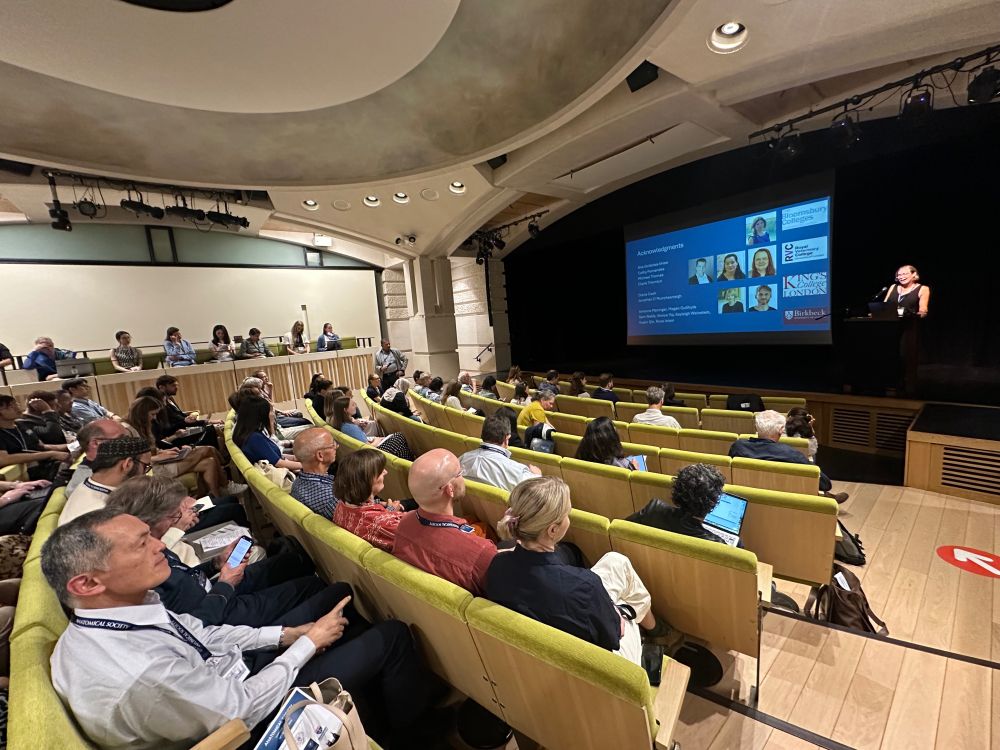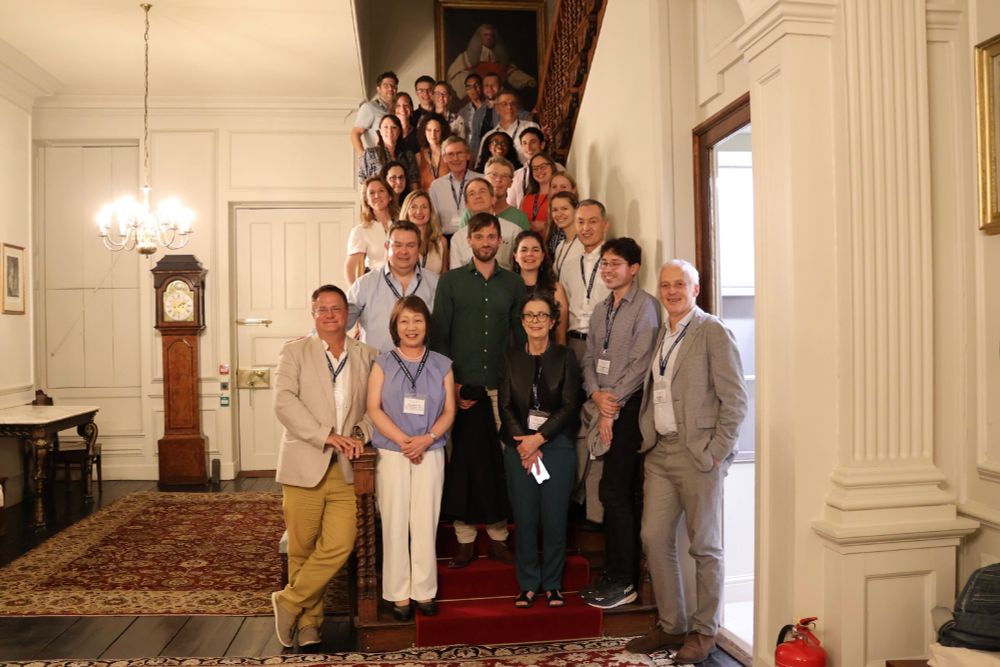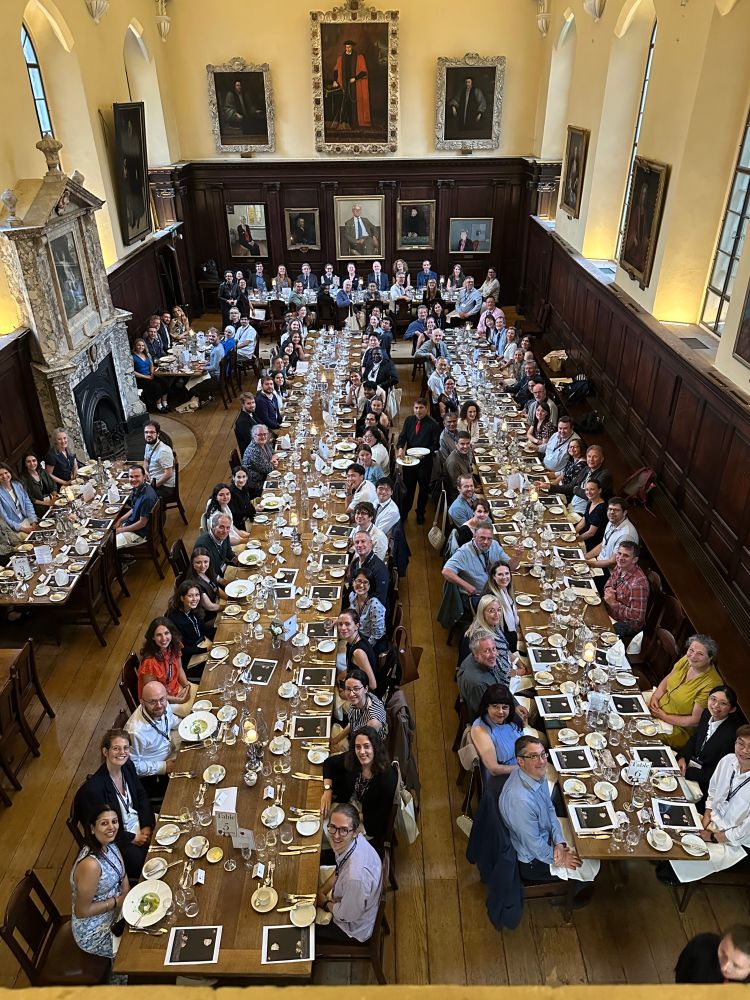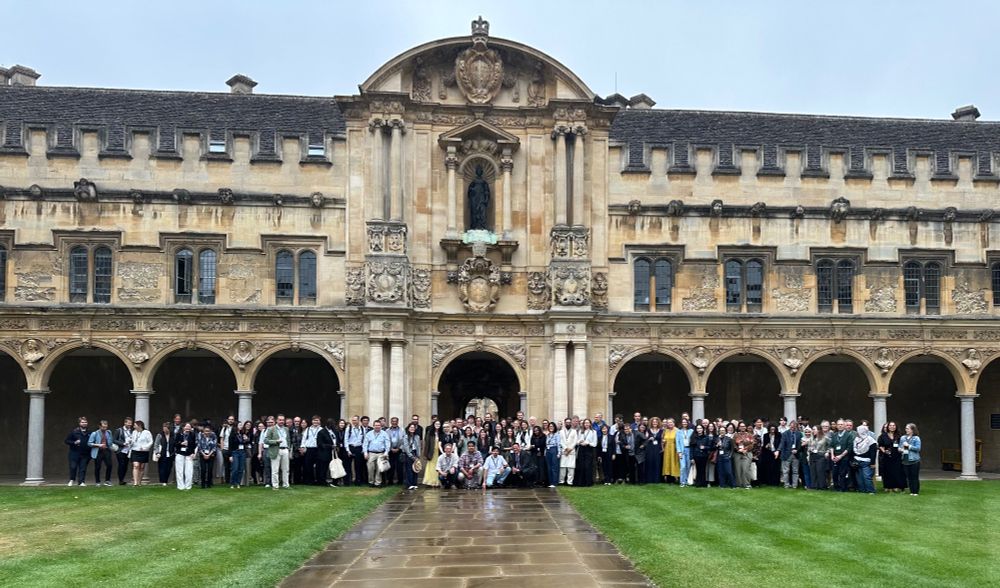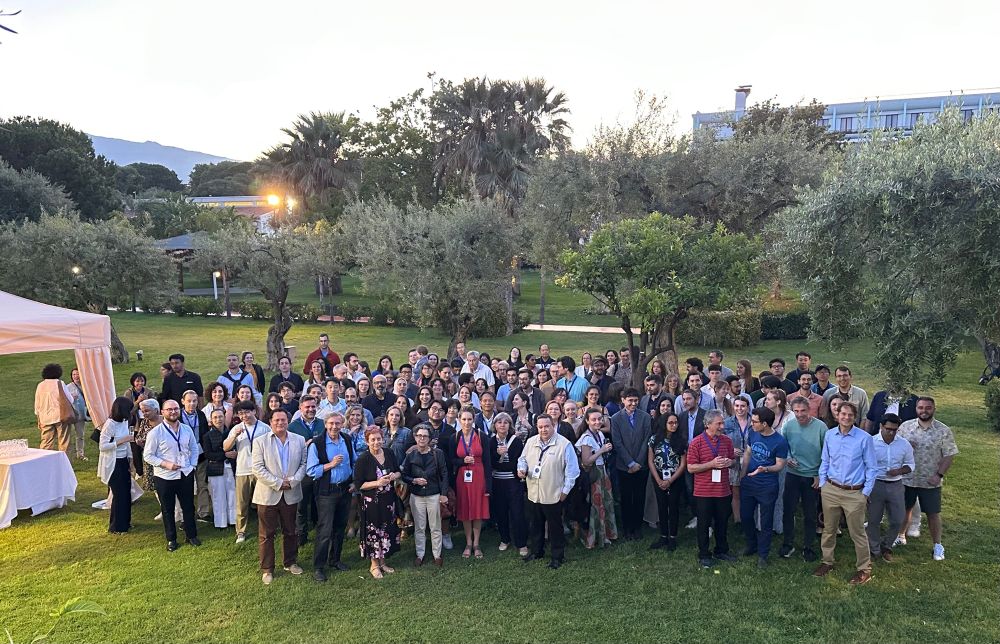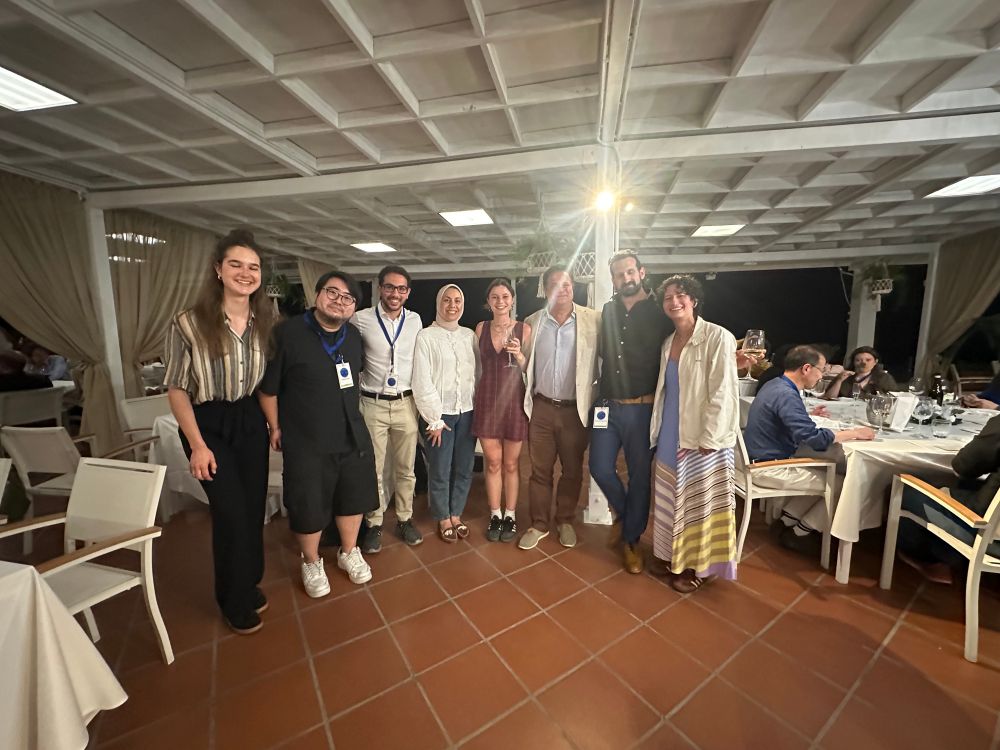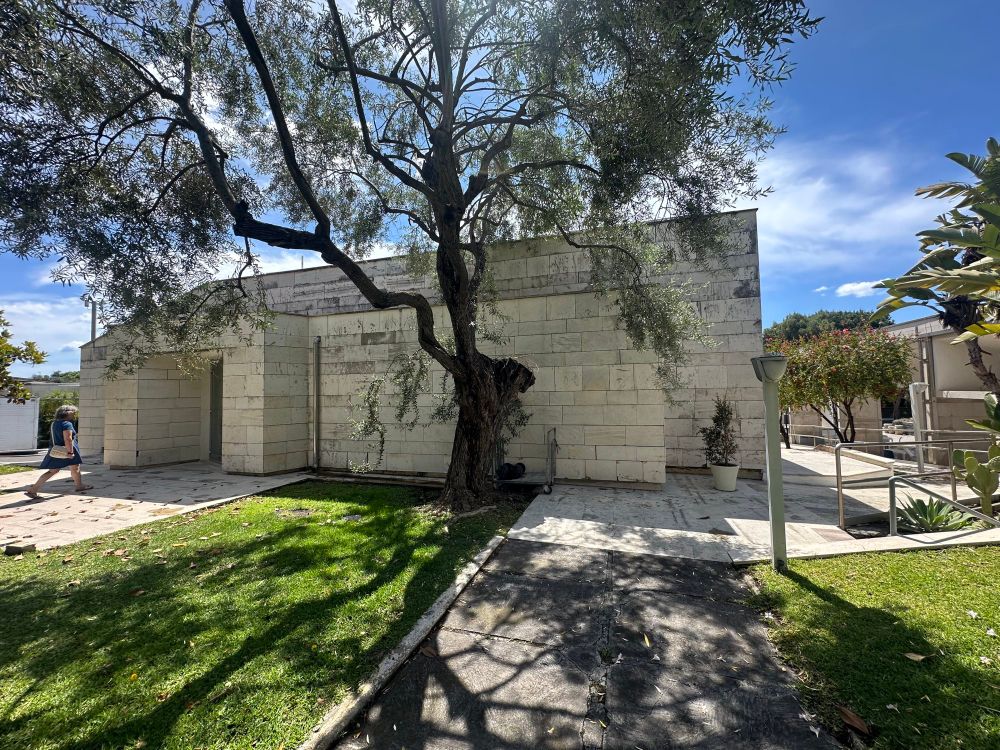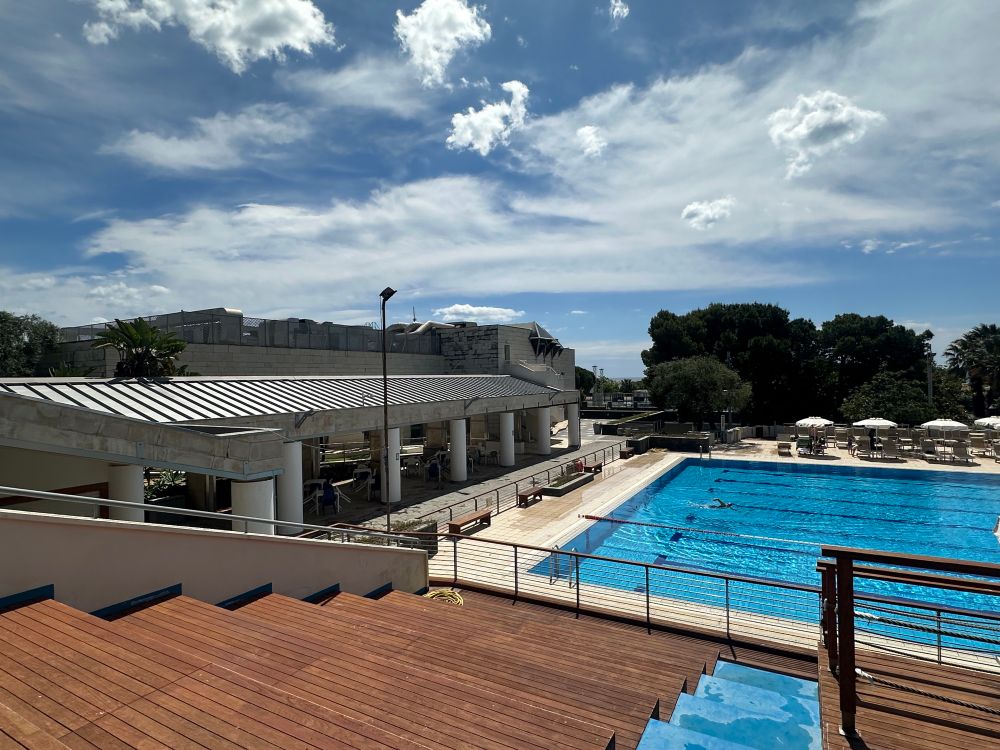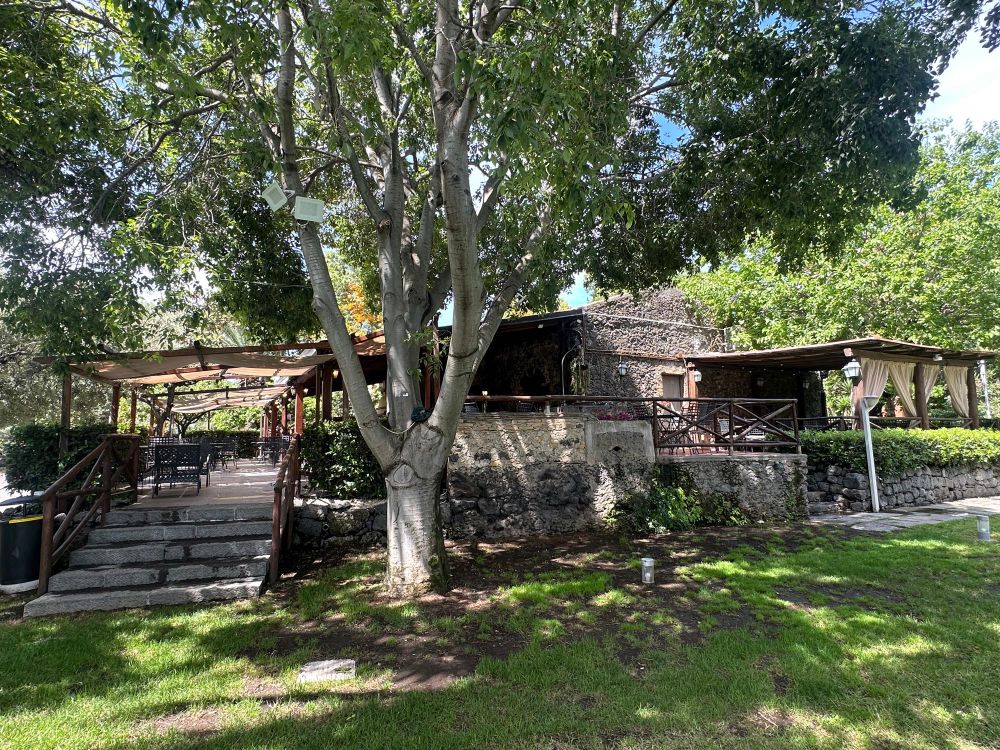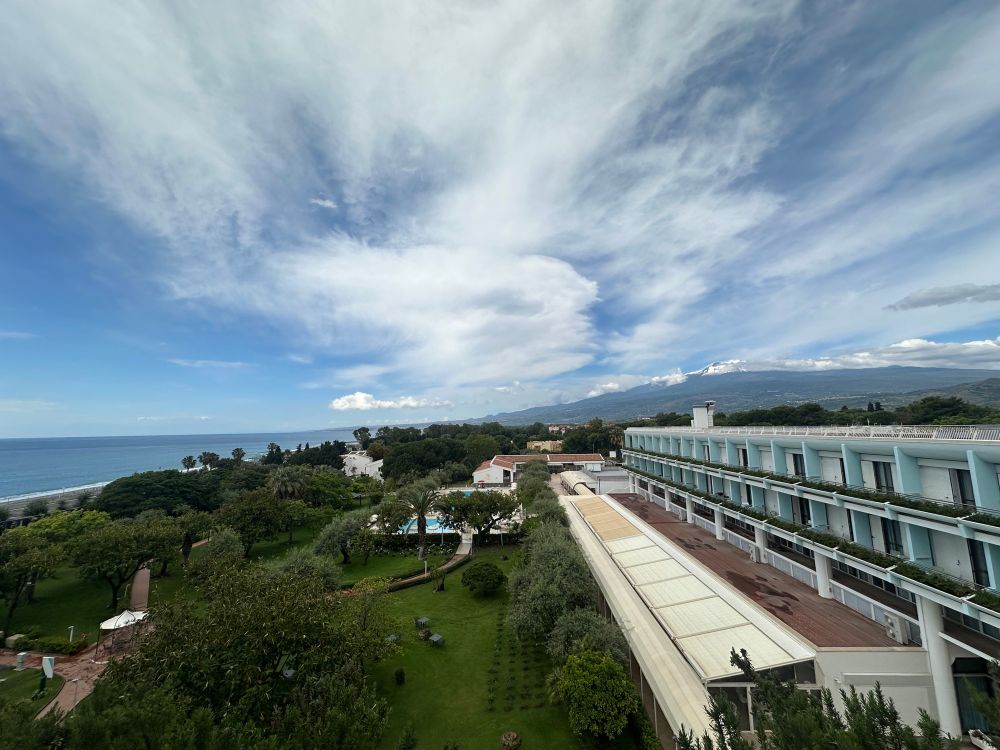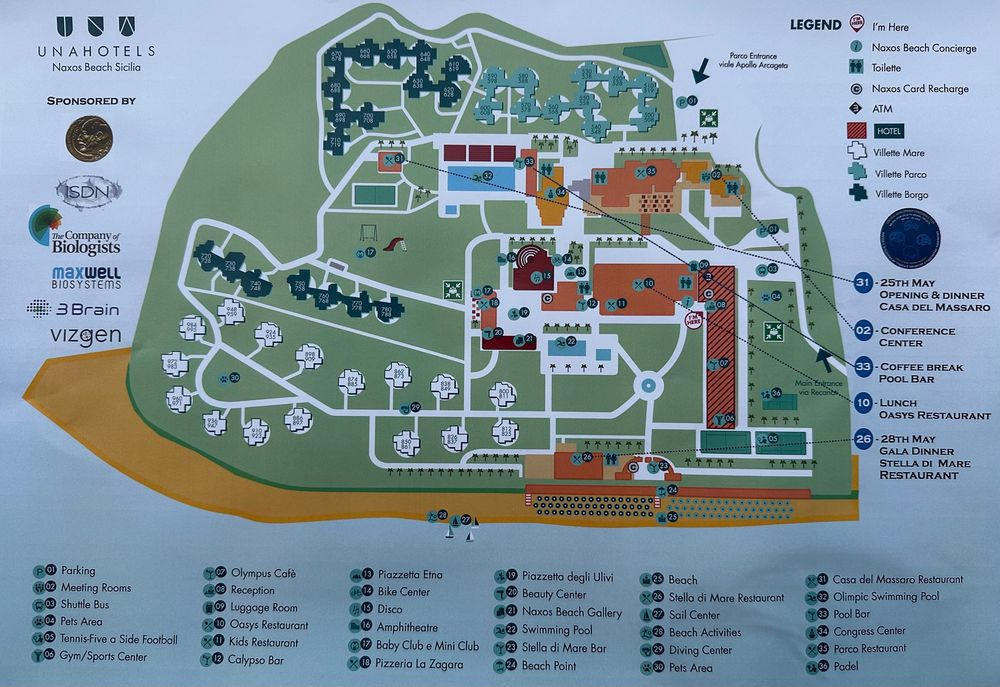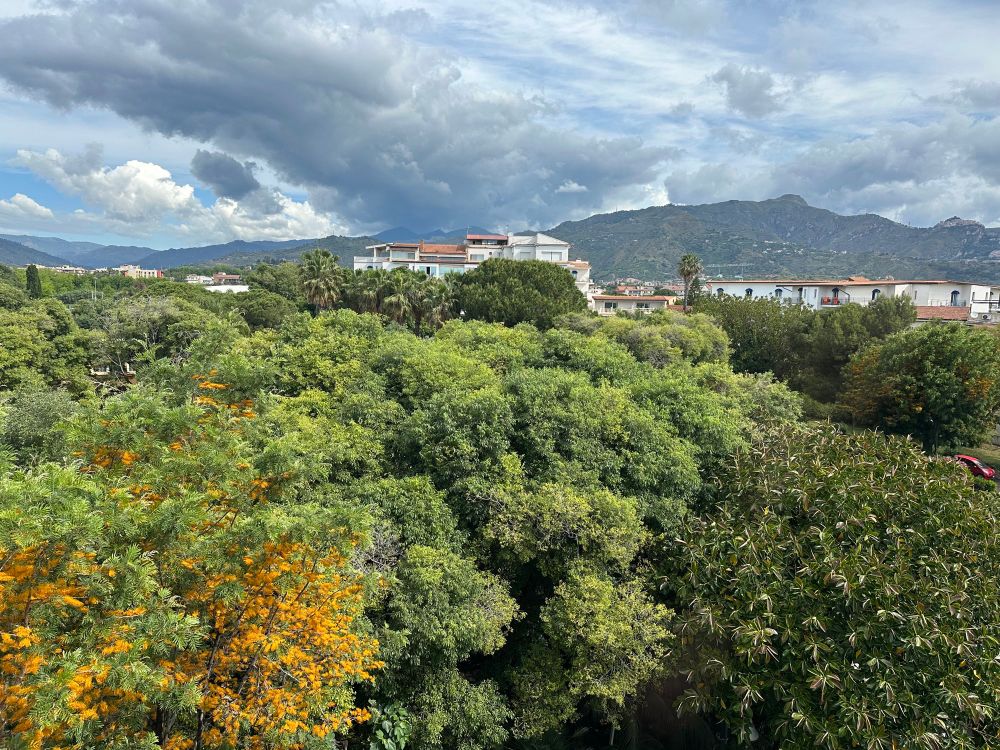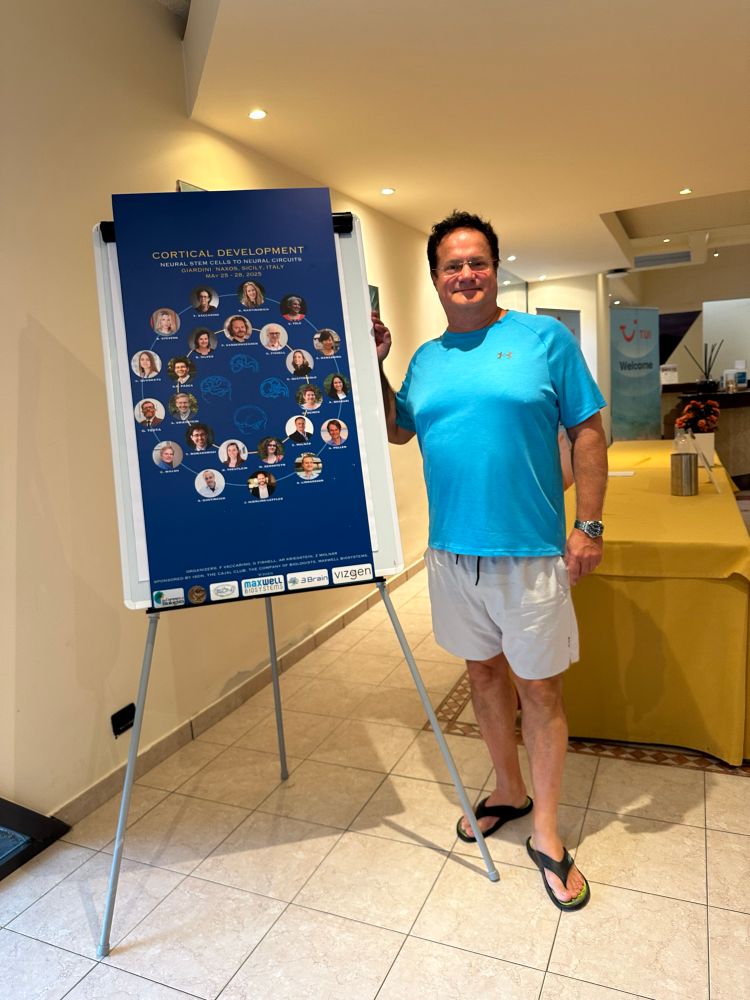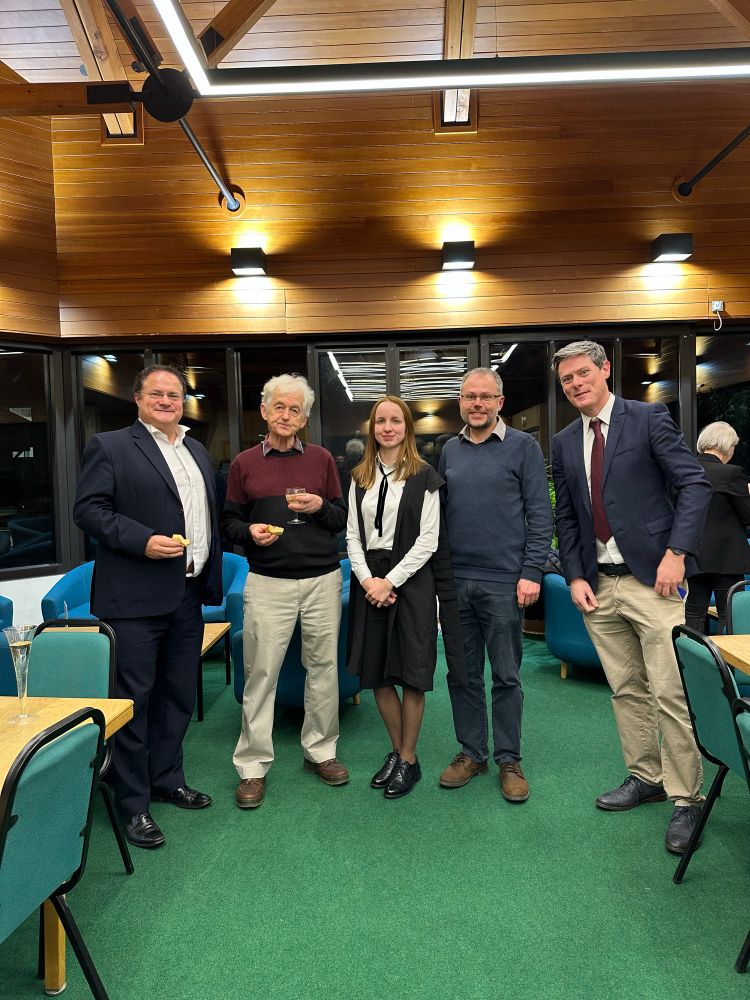
Development and function of cortical networks
September 29, 2025
Mainz, Campus of the JGU Mainz, BFZ, Duesbergweg 6, Germany
www.unimedizin-mainz.de/phys.../vera...
This scientific symposium was organised to honor the scientific contributions and achievements of Prof. Heiko J. Luhmann Dr. Luhmann
06.10.2025 09:04 — 👍 1 🔁 0 💬 0 📌 0
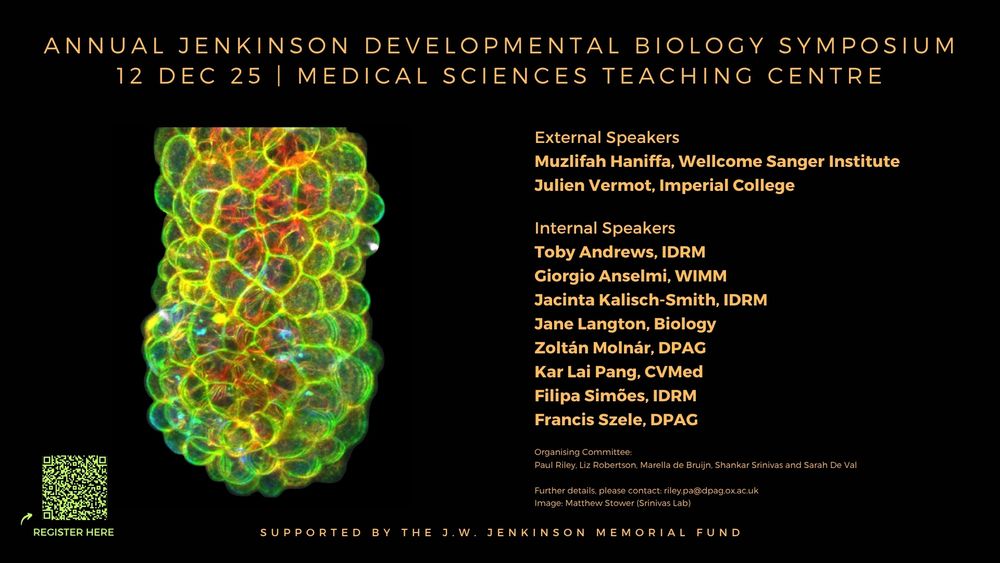
Jenkinson Developmental Biology Symposium, at the MSTC, on 12 Dec 25.
Registration is now open: please note that registration is mandatory but free of charge. Registration will close on 28 Nov.
02.10.2025 11:23 — 👍 3 🔁 1 💬 0 📌 0

T14 isn’t just a fragment — it’s a signalling peptide shaping brain development & activity. Its dysregulation may help explain Alzheimer’s according to Susan Greenfield. The team is celebrating the publication 👉 doi.org/10.3390/ijms...
Widespread changes in T14 after manipulations of activity.
27.09.2025 13:16 — 👍 2 🔁 0 💬 0 📌 0


CORTICAL EVOLUTION - 15-17th June 2026 - Bilbao Spain
Organizers: Verónica Martínez Cerdeño, Fernando García Moreno, Elena Vecino, and Stephen Noctor
Early registration until 1st May 2026
ventricular.org/corticalevol...
@veronicamartinez.bsky.social @phylobrain.bsky.social
27.09.2025 09:12 — 👍 14 🔁 2 💬 0 📌 1

Official group photo taken by Professor Kristine Krug
27.09.2025 09:08 — 👍 0 🔁 0 💬 0 📌 0
The search for the mechanisms cortical regulation of sleep continues. Latest collaborative work suggests that part of the answer lies in the cortex.
By switching cortical neurons on and off, we could change how much sleep animals got — and even the quality of that sleep. doi.org/10.1101/2025...
18.09.2025 10:13 — 👍 14 🔁 4 💬 0 📌 0


New collaborative research from the Szele Laboratory identifies Galectin-3 as a key regulator of neural development, establishing its contribution to brain growth.
For more details: www.dpag.ox.ac.uk/.../new-rese....
To read the paper: www.science.org/doi/10.1126/...
08.09.2025 22:18 — 👍 5 🔁 0 💬 0 📌 0

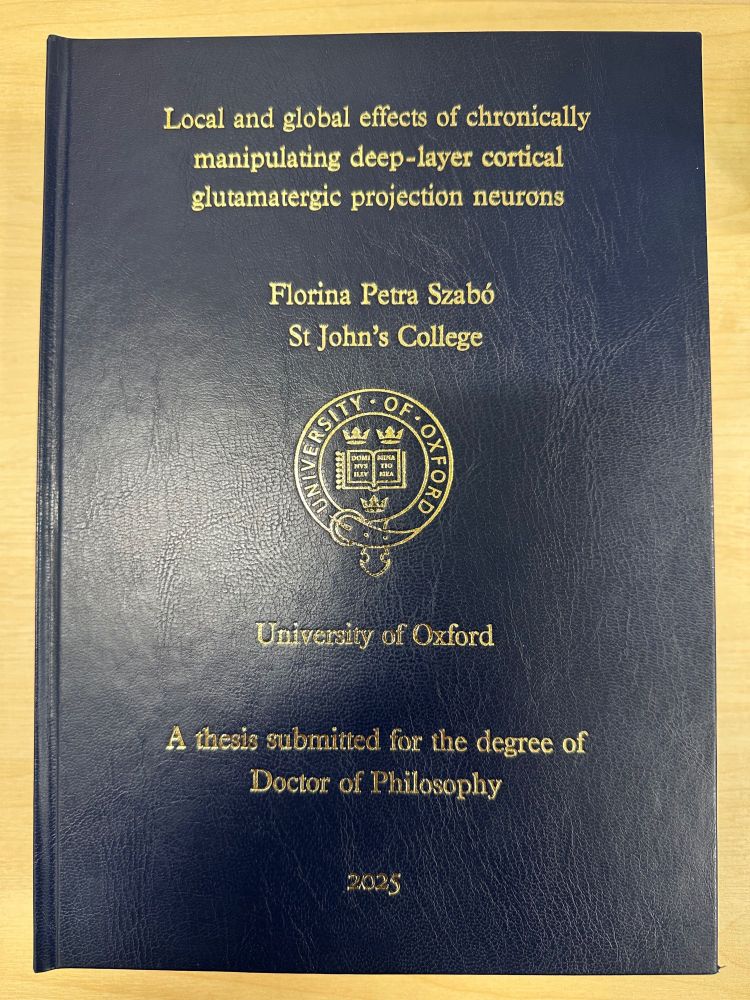
Congratulations to Florina Szabó who defended her DPhil. Thanks to the examiners Prof Nicoletta Kessaris (UCL) and Prof Simon Butt (@interneuron.bsky.social); to Anatomical Society and to Dr Anna Hoerder-Suabedissen for co-supervising. One chapter is already published: doi.org/10.1111/joa....
24.07.2025 10:48 — 👍 5 🔁 0 💬 0 📌 0
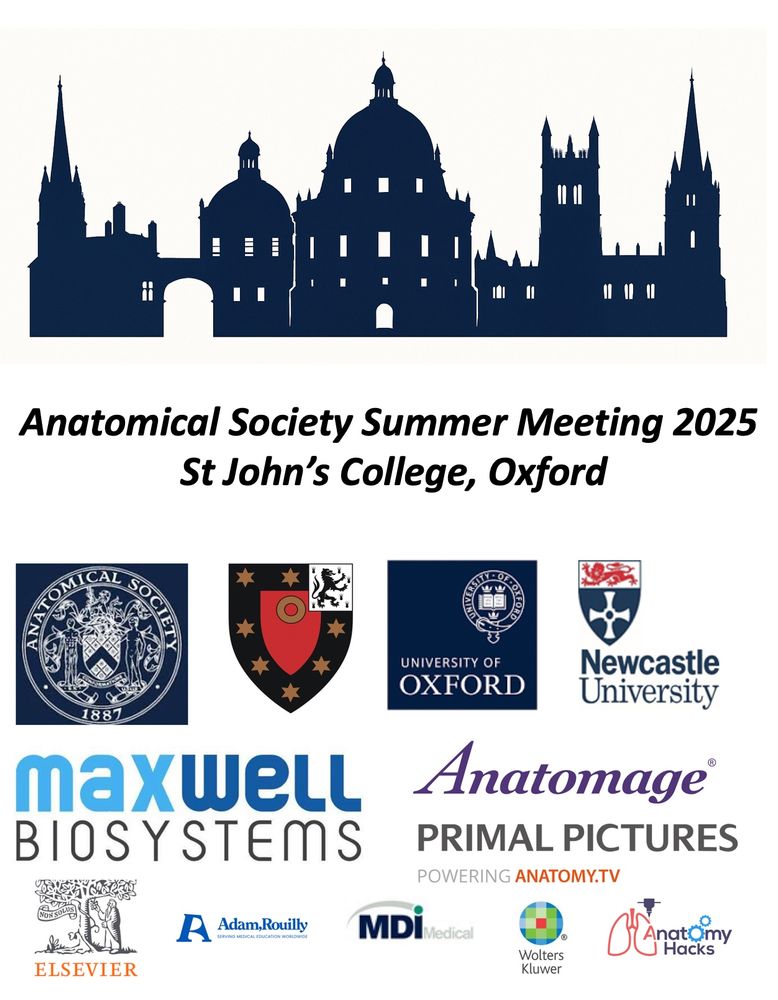
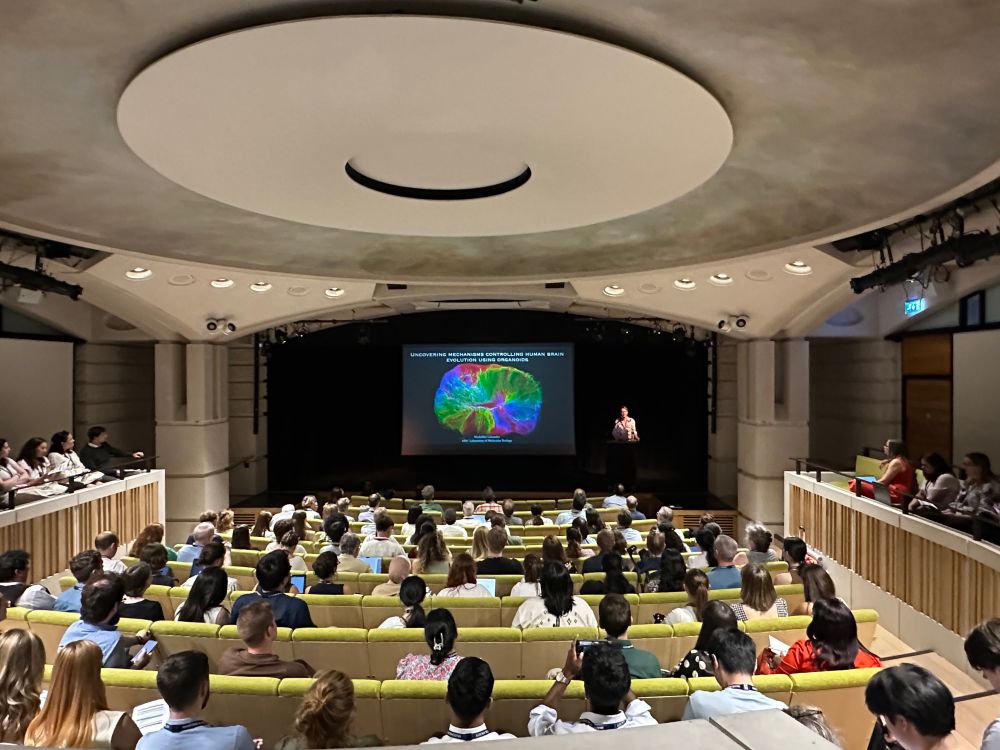
We say thanks to @stjohnsox.bsky.social & @oxforddpag.bsky.social, and Molnar Lab (www.dpag.ox.ac.uk/research/mol...) who helped during the Summer Meeting of the Anatomical Society. Thanks to our sponsors who supported our meeting. Read more on DPAG news: www.dpag.ox.ac.uk/news/anatomi...
21.07.2025 09:50 — 👍 0 🔁 0 💬 0 📌 0
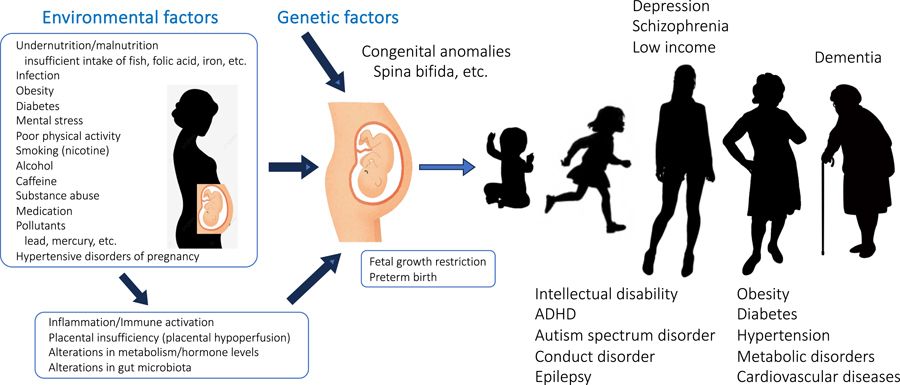
Possible long-term effects of environmental and genetic factors on an individual’s life.
Background: Healthcare costs are rising at an exponential rate. Given the constraints of limited resources, it is essential to make informed decisions about priorities to ensure the best possible health outcomes globally. The history of medicine illustrates how these priorities have shifted over time – from early focus on infectious diseases to later emphasis on noncommunicable conditions such as metabolic disorders. Today, neurodegenerative diseases and aging brain are the forefront of medical research, as these conditions profoundly affect individuals, families, and society. Summary: One in three people will experience a mental health disorder in their lifetime, yet it is not widely recognized that many of these conditions may have origins in pre-birth experiences and early life influences. Disruptions in progenitor proliferation, neuronal and glial migration, and differentiation during prenatal development can contribute to lifelong neurodevelopmental abnormalities. Despite the fundamental importance of brain development, most of the neuroscience funding is allocated to studying neurodegeneration, such as dementia and Parkinson’s disease, while early life influences remain underexplored. Crucially, the impact of developmental factors begins even before conception. Environmental risks extend beyond direct maternal exposures during pregnancy; they include cumulative parental exposure to teratogenic agents affecting both male and female gametes, as well as early life environmental exposures affecting newborns, infants, and children. These influences are complex yet highly relevant to long-term health outcomes. Key Messages: We urge greater recognition of the developmental origins of disease and advocate for increased investment in preventive strategies. These include lifestyle modifications, dietary improvements, targeted supplementation, regular exercise, and minimizing exposu…
Why wait until the damage is done?
Our new paper highlights how many brain and mental health disorders begin before birth — yet most funding still targets late-life neurodegeneration.
It’s time to invest in prevention.
🔗 doi.org/10.1159/0005...
03.07.2025 08:27 — 👍 5 🔁 0 💬 0 📌 0
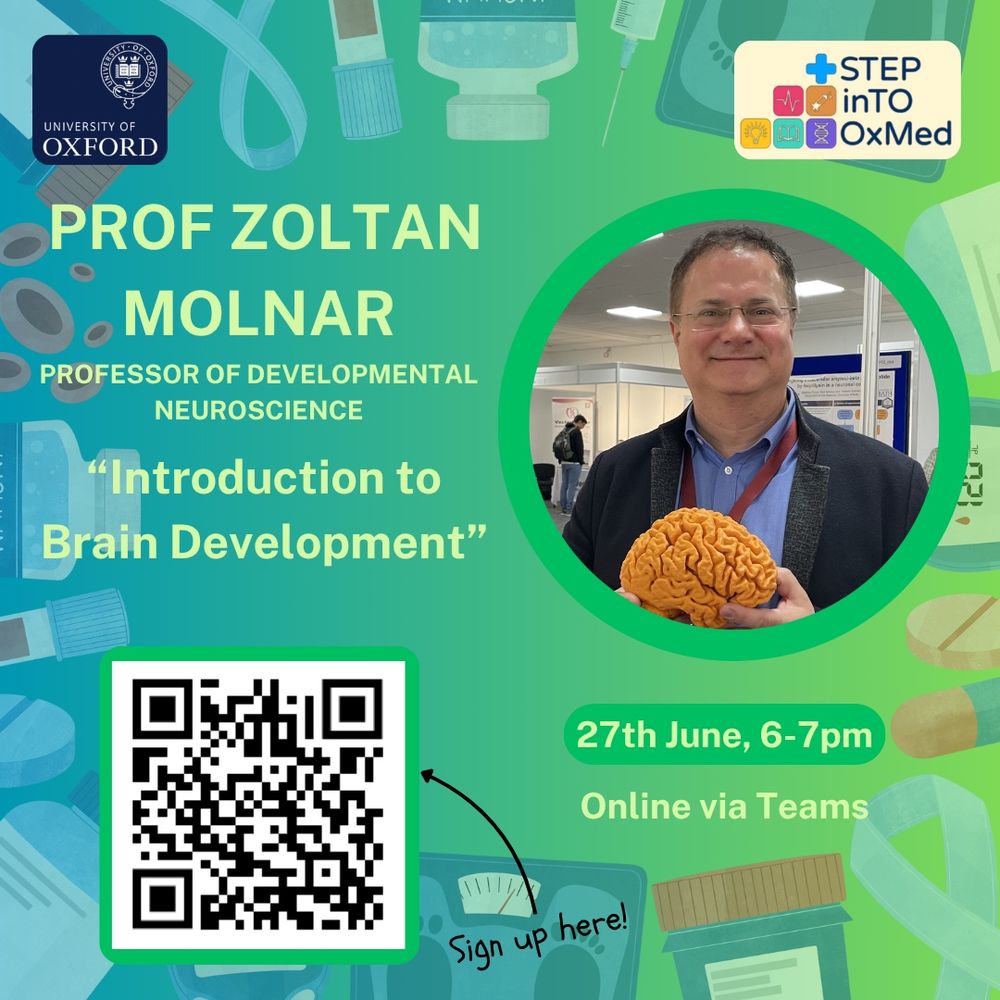
My STEP inTO OxMed talk "INTRODUCTION TO BRAIN DEVELOPMENT" is for 14-17 year old secondary school/ sixth form students this Friday.
24.06.2025 10:58 — 👍 3 🔁 0 💬 0 📌 0
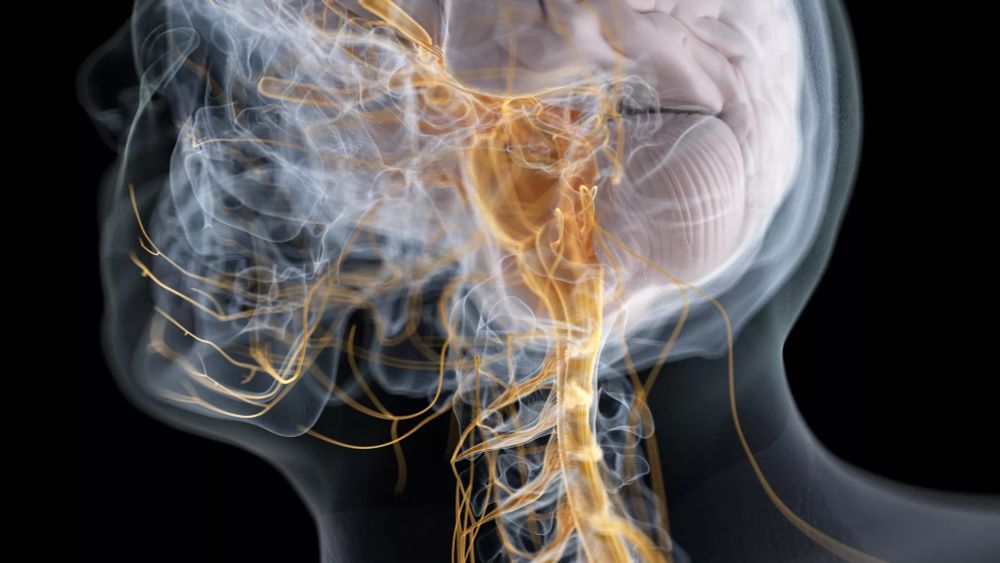
Frontiers | Chronic silencing of Drd1a-Cre+ neurons impairs dopaminergic-driven cortical activation
Collaborative work between the Mann and Molnár Groups at @OxfordDPAG have studied a small group of specialized brain cells to investigate how they play a powerful role in keeping us alert and helping our brains process sensory information (doi.org/10.3389/fnan...).
10.05.2025 08:39 — 👍 1 🔁 0 💬 0 📌 0
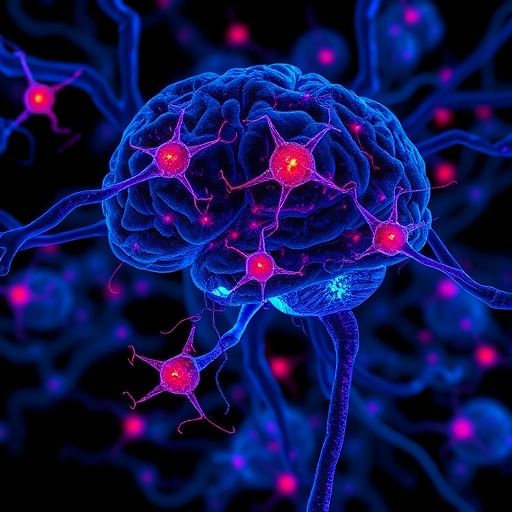
Succinct, yet comprehensive summary of our paper doi.org/10.1038/s413... in scienmag.com
See: scienmag.com/orexin-sensi...
Possible functions of a subpopulation of neurons within lower part of layer 6 of the cerebral cortex that exhibits sensitivity to orexin.
09.05.2025 04:16 — 👍 3 🔁 0 💬 0 📌 0
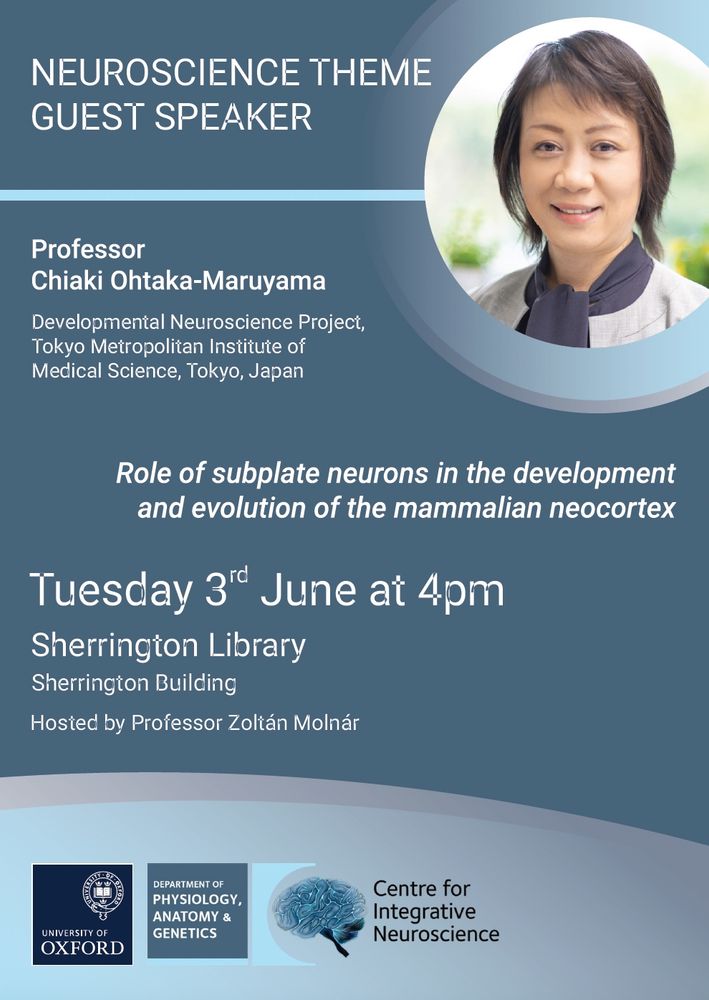
Role of subplate neurons in the development and evolution of the mammalian neocortex
3 June 2025, 16:00
Sherrington Library, Sherrington Building DPAG
Professor Chiaki Ohtaka-Maruyama from Tokyo Metropolitan Institute of Medical Science, Tokyo, Japan
talks.ox.ac.uk/talks/id/067...
06.05.2025 11:24 — 👍 1 🔁 0 💬 0 📌 0
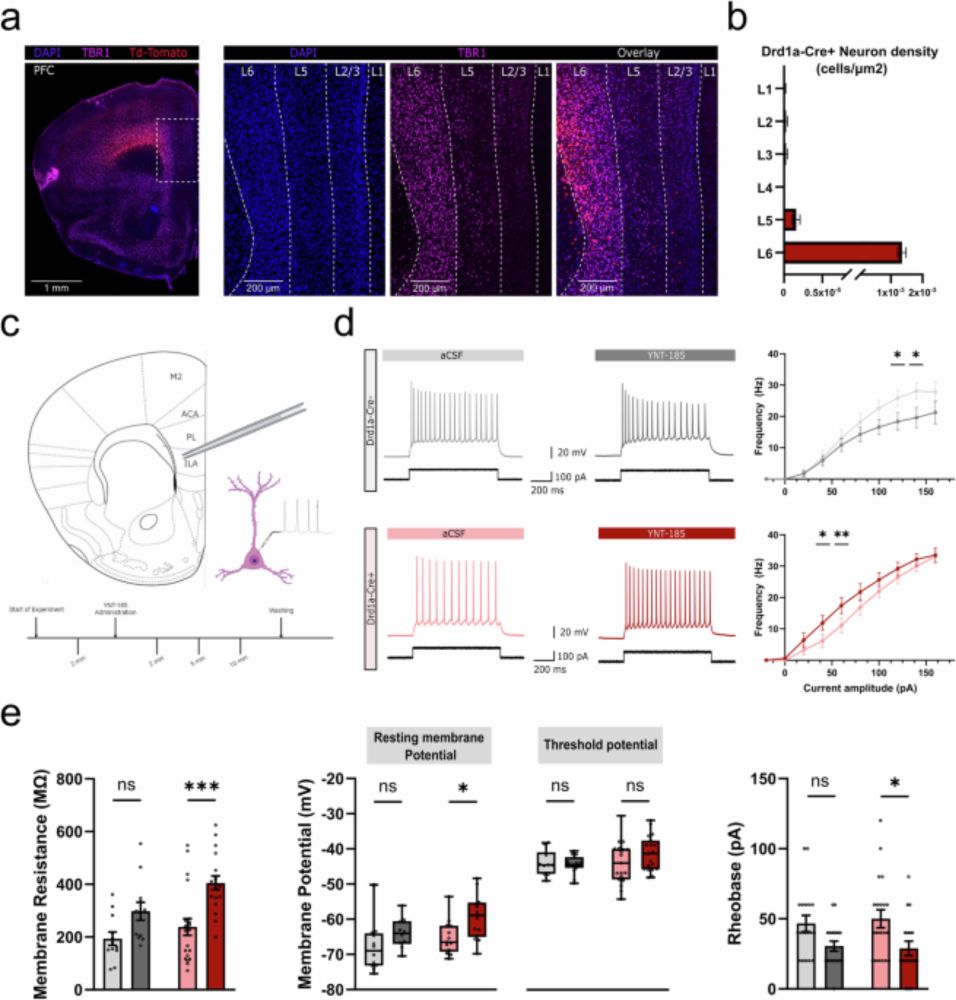
An orexin-sensitive subpopulation of layer 6 neurons regulates cortical excitability and anxiety behaviour - Translational Psychiatry
Translational Psychiatry - An orexin-sensitive subpopulation of layer 6 neurons regulates cortical excitability and anxiety behaviour
A collaborative study from Molnár, Mann, Bannerman and Lak labs has uncovered a population of brain cells that could play a critical role in how we experience stress and anxiety. (Messore, Narayan Therpurakal et al., 2025 - doi.org/10.1038/s413...), www.dpag.ox.ac.uk/news/molnar-...
29.04.2025 09:55 — 👍 1 🔁 1 💬 0 📌 0
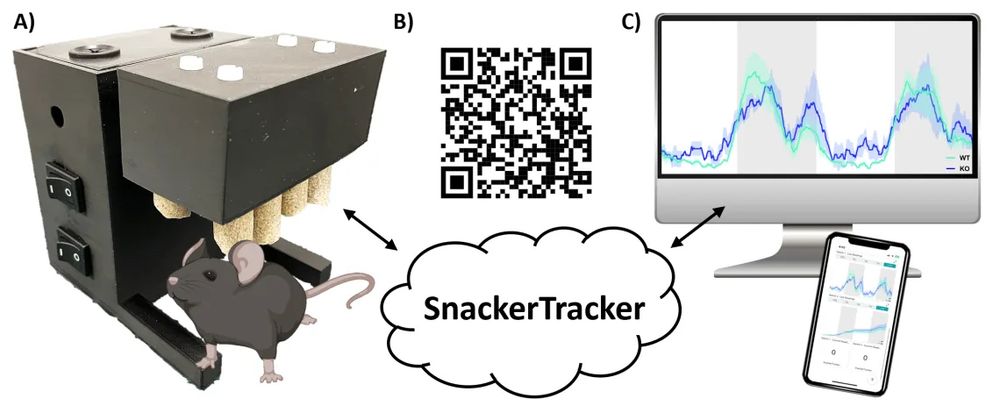
Researchers at the University of Oxford have developed a low-cost open-source home-cage monitoring system which measures the food intake and feeding behaviour of laboratory mice. doi.org/10.12688/wel....
www.dpag.ox.ac.uk/.../the-snac....
24.04.2025 07:43 — 👍 2 🔁 0 💬 0 📌 0
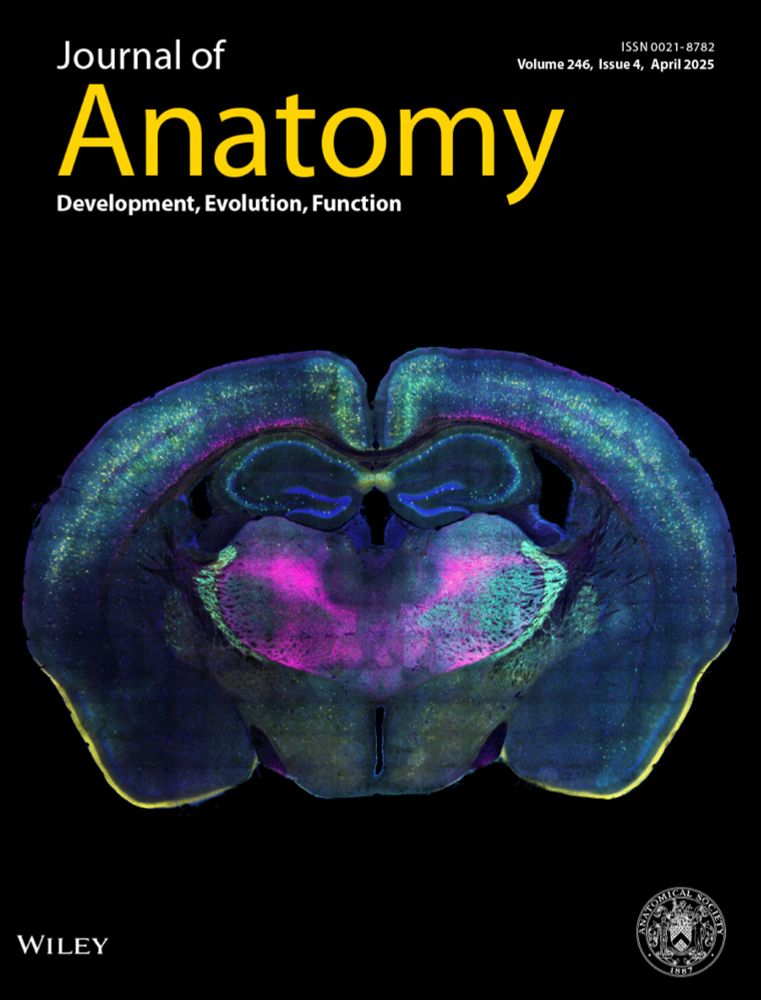
Florina Szabó makes the cover of the @journalofanatomy.bsky.social. The paper is on the bidirectional interaction between deep-layer pyramidal cells and GABAergic neurons, describing the impact of interrupting pyramidal neuron activity on inhibitory network formation. doi.org/10.1111/joa....
27.03.2025 01:40 — 👍 9 🔁 0 💬 0 📌 0
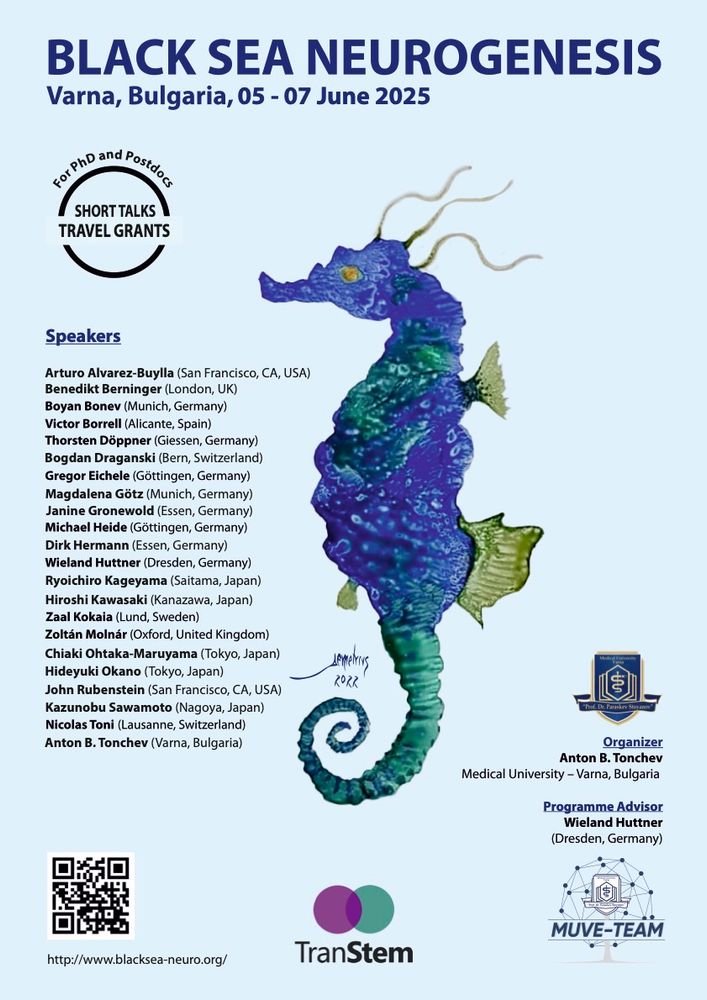
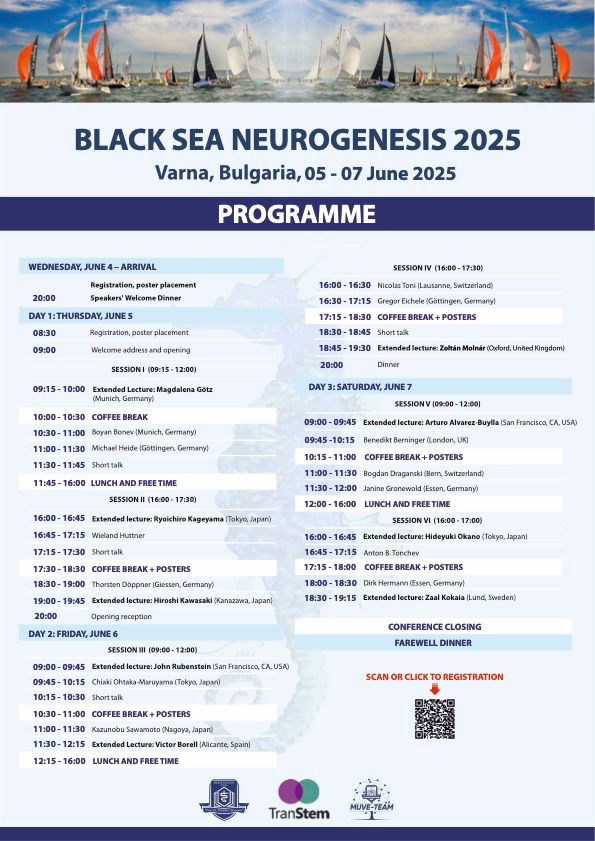
Black Sea Neurogenesis 2025 - Varna, Bulgaria, 05-07 June 2025
www.mu-varna.bg/EN/AboutUs/P...
22.02.2025 15:00 — 👍 6 🔁 2 💬 1 📌 0
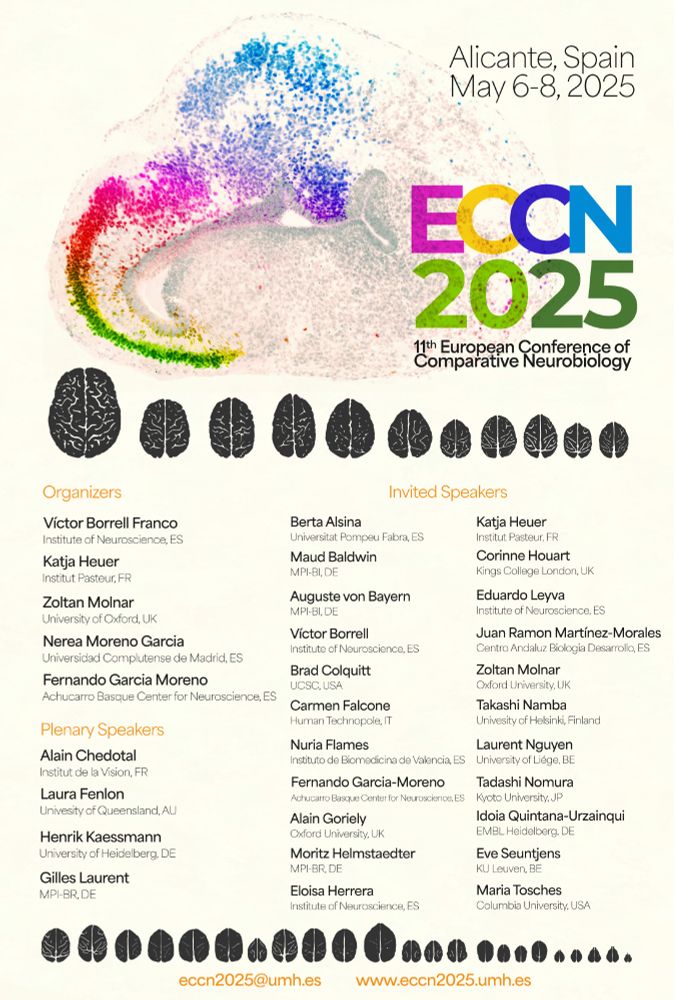
The new edition of European Conference on Comparative Neurobiology, ECCN2025 will take place from May 6th to 8th in beautiful Alicante (Spain) and soon you will be able to register and submit your abstracts through the conference website: eccn2025.umh.es
29.01.2025 22:44 — 👍 19 🔁 10 💬 0 📌 0
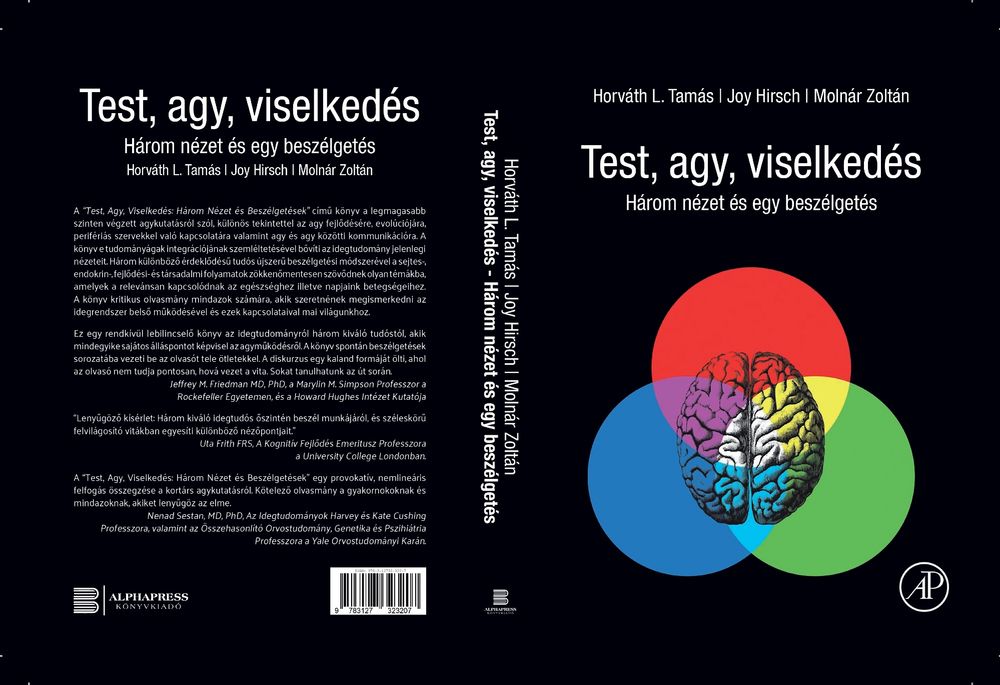
A “Test, Agy, Viselkedés: Három Nézet és Beszélgetések” című könyv a legmagasabb szinten végzett agykutatásról szól, különös tekintettel az agy fejlődésére, evolúciójára, perifériás szervekkel való kapcsolatára valamint agy és agy közötti kommunikációra. A könyv e tudományágak integrációjának szemléltetésével bővíti az idegtudomány jelenlegi nézeteit. Három különböző érdeklődésű tudós újszerű beszélgetési módszerével a sejtes-, endokrin-, fejlődési- és társadalmi folyamatok zökkenőmentesen szövődnek olyan témákba, amelyek a relevánsan kapcsolódnak az egészséghez illetve napjaink betegségeihez. A könyv kritikus olvasmány mindazok számára, akik szeretnének megismerkedni az idegrendszer belső működésével és ezek kapcsolataival mai világunkhoz.
Publisher: Alphapress Könyvkiadó és Nyomdai Kft. Székesfehérvár 8000 Székesfehérvár Homoksor 7. Budapest 1196 Budapest, Hofherr Albert 38-42. E-mail: nyomda@alphapress.hu Fordította: Dr. Vitéz-Móré Tamás; Szakmailag lektorálta: Horváth L. Tamás , Molnár Zoltán. Felelős kiadó az Alphapress Könyvkiadó és Nyomdai Kft. Székesfehérvár 8000 Székesfehérvár Homoksor 7. Budapest 1196 Budapest, Hofherr Albert 38-42. E-mail: nyomda@alphapress.hu isbn:978-615-6235-16-9.ISBN: 978-615-6235-16-9.
Test, agy, viselkedés - Három nézet és egy beszélgetés.
alphapress.hu/termek/test-...
Hungarian translation of: Tamas Horvath, Joy Hirsh, Zoltán Molnár (2022) Body, Brain, Behavior - Three Views and a Conversation ELSEVIER,
www.amazon.co.uk/Body-Brain-F...
27.01.2025 19:10 — 👍 0 🔁 0 💬 0 📌 0
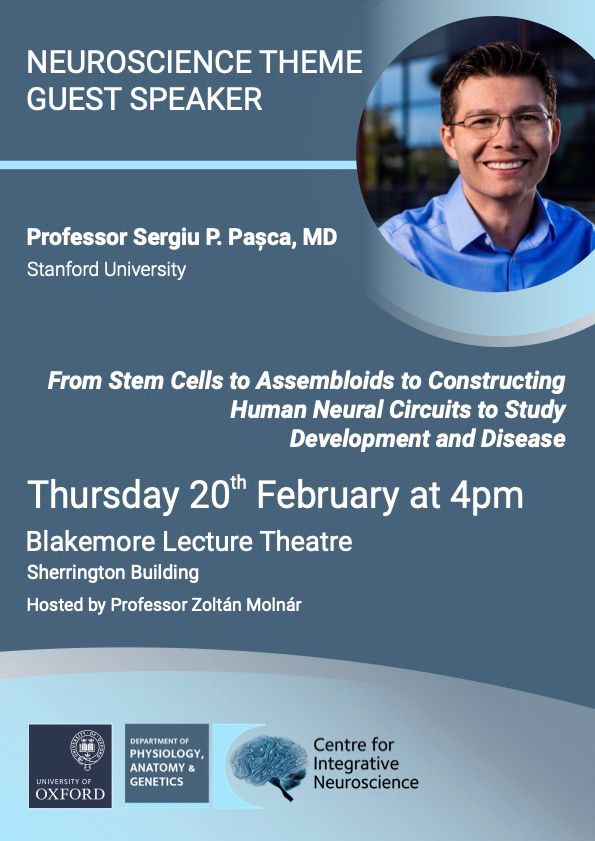
From Stem Cells to Assembloids to Constructing Human Neural Circuits to Study Development and Disease
@sergiuppasca.bsky.social Stanford University
4PM, Thursday, 20th February 2025 Blakemore Lecture Theatre, Sherrington Building
@oxforddpag.bsky.social
@oxneuro.bsky.social
20.01.2025 14:14 — 👍 2 🔁 1 💬 0 📌 1
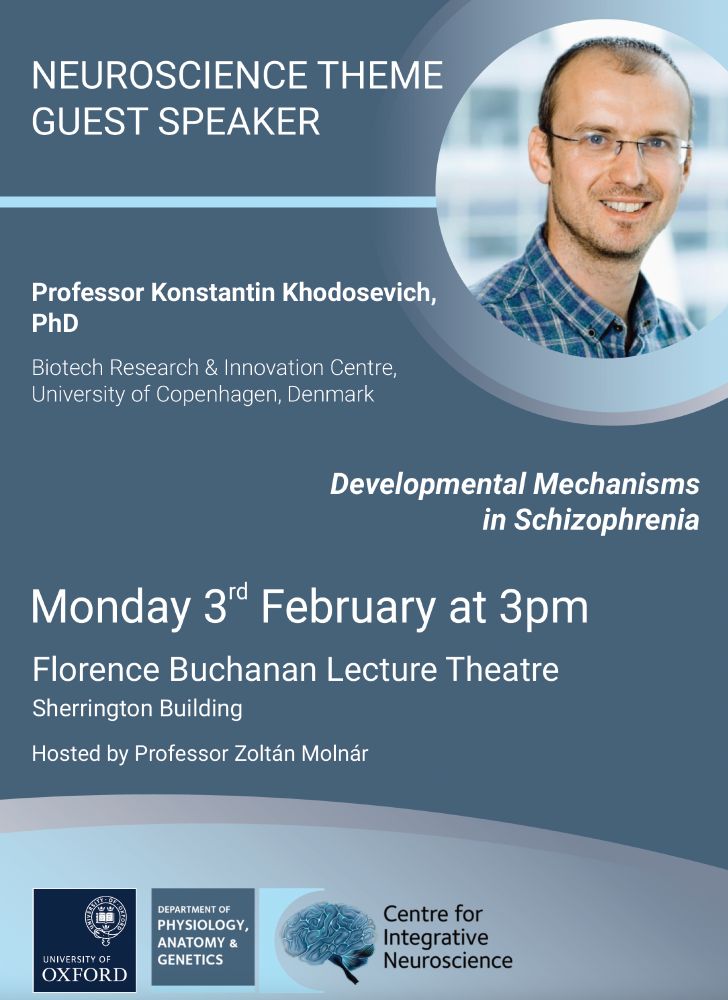
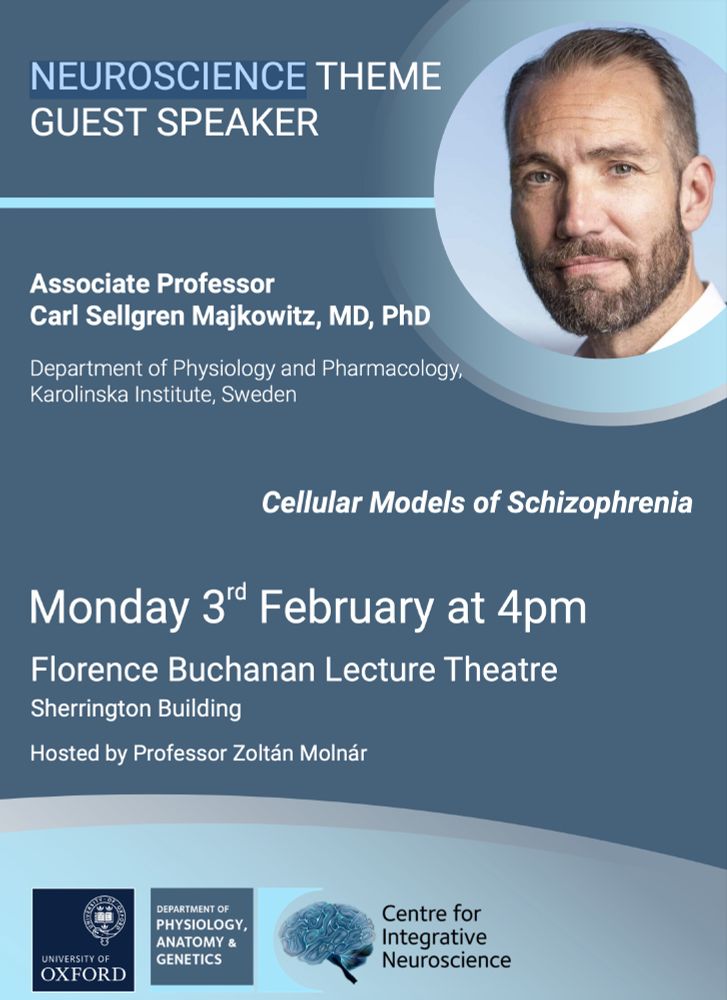
Special Neuroscience Seminars on SCHIZOPHRENIA –
Developmental Mechanisms in Schizophrenia talks.ox.ac.uk/talks/id/b4b...
Cellular Models of Schizophrenia
talks.ox.ac.uk/talks/id/cbb...
@UCPH_BRIC, @karolinskainst.bsky.social @oxneuro.bsky.social
07.01.2025 12:08 — 👍 2 🔁 0 💬 0 📌 0
Academia Europaea, founded in 1988, is a European Academy of Humanities, Letters and Sciences with more than 5,500 members including 88 Nobel laureates.
Cortical Development Conference 2025
Neural Stem Cells to Neural Circuits
Giardini Naxos, Sicily, Italy
Date: 25 May to 28 May 2025
Organizers: G Fishell, AR Kriegstein, Z Molnár and F Vaccarino
@corticaldev2025
Science news from the medical university Karolinska Institutet (KI) in Sweden. Our vision is to advance knowledge about life and strive towards better health for all. https://ki.se/
The University of Oxford is at the forefront of neuroscience, psychology, and psychiatry research.
Neuroscientist and glial aficionado at NYU Grossman School of Medicine/NYU Langone Health in NYC. Posts in my individual/personal capacity.
My lab is full of awesome people doing amazing stuff - check them out: www.liddelowlab.com
he/him
Auditory neuroscientist, UCL Prof, trail runner, landlocked boaty, mum was @bizifer elsewhere
Neuroscientist heading the Cragglab!
How the mammalian brain comes online with a focus on local GABAergic interneurons | electrophysiology & imaging | in vitro & in vivo approaches 🧠🧪
Professor of Psychology & Cognitive Neuroscience at Cambridge, FBA FMedSci FRS. Adolescent brain development. Views my own. Book: http://amazon.co.uk/dp/1784161349
Cognitive Neuroscientist at University of Oxford; Tutorial Fellow in Psychology at St John's College.
Advancing the frontiers of basic science through grantmaking, research and public engagement. Sign up for our newsletter: simonsfoundation.org/newsletter
Neurobiologist. Learning. Memory. Motivation. Dopamine.
The funder-researcher collaboration and open-access publisher for research in the life and biomedical sciences.
Follow @eLifeCommunity.bsky.social
Glaswegian Neuroscientist running a systems neuro lab @uofglasgow.bsky.social. Interests: ephys, interneurons, thalamus, oscillations, dementia, schiz & neuroinflammation. Dad, leftie, runner, wannabe chef, atheist. He/him
Neuroscientist at University of Bristol. Cortical circuits, PFC, interneurons, dopamine, brain development.
https://www.anastasiades-lab.org
Computational neuroscientist bringing machine and neural learning closer together @ox.ac.uk @oxforddpag.bsky.social 🇵🇹🇪🇺🇬🇧🌳
neuralml.github.io
Neuroscientist investigating neuronal bases of reward and learning. Associate Prof at Oxford University. www.laklab.org
Keeping in touch with prospective students, current members of College, alumni & benefactors, and sharing our research and events with the world.



















